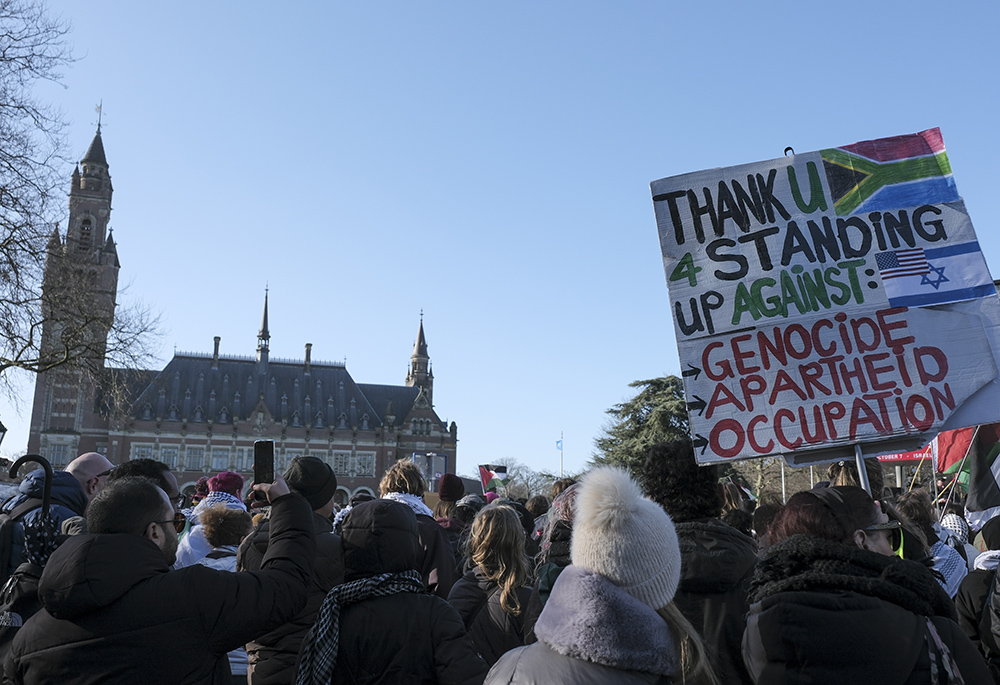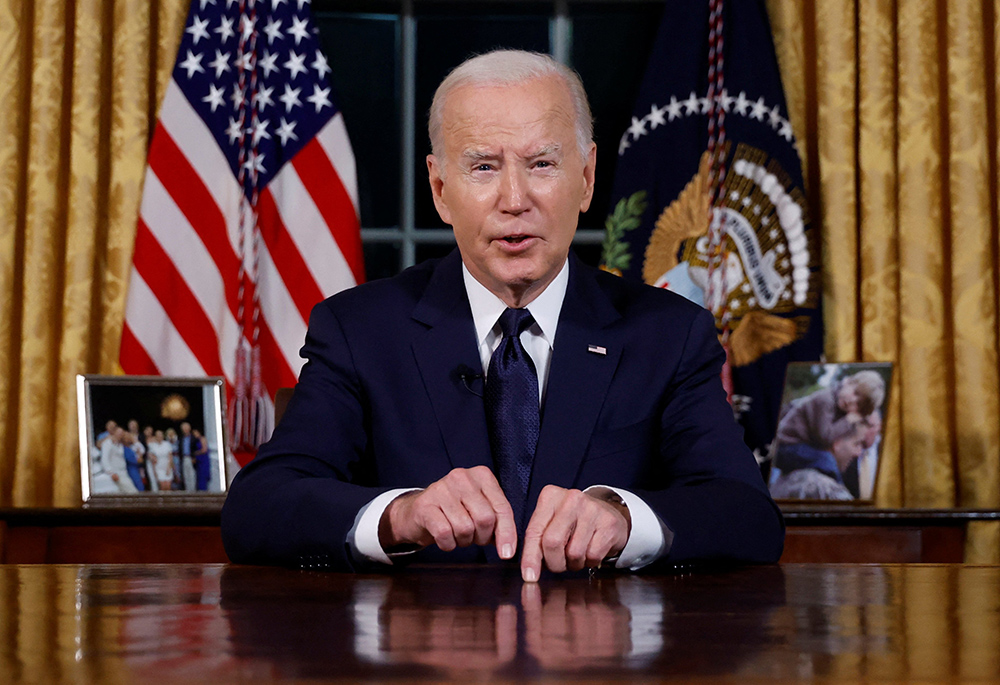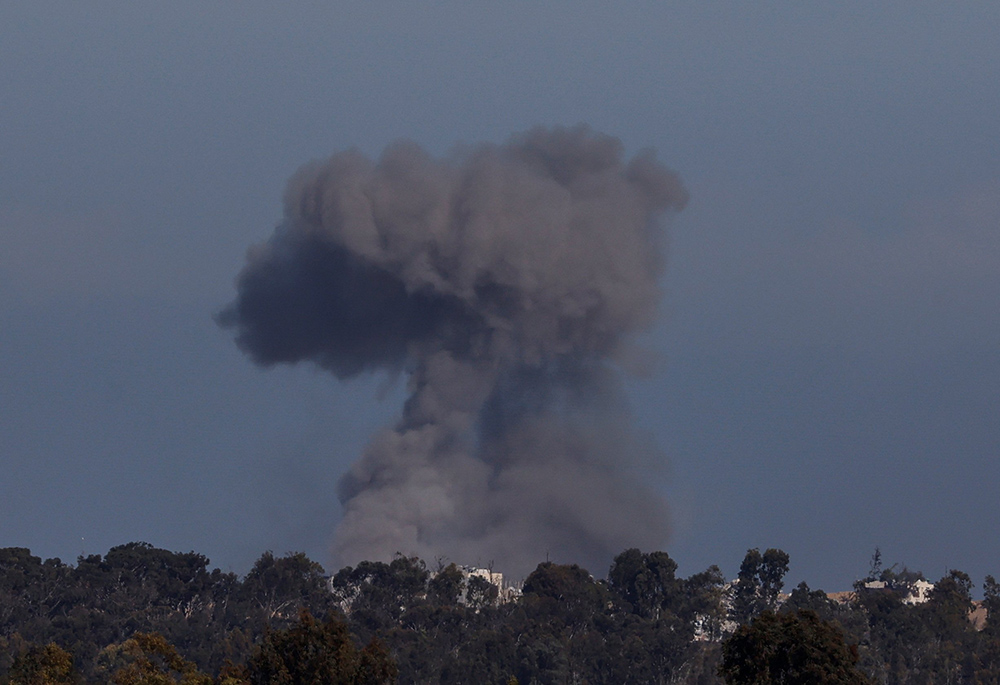
Pro-Palestinian activists gather near the International Court of Justice, or World Court, Jan. 26 in The Hague, Netherlands. The United Nations' top court has decided not to throw out genocide charges against Israel for its military offensive in Gaza. (AP photo/Patrick Post)
In his unconditional support for Israel as it pummels Gaza, President Joe Biden not only has a moral problem, but a legal one.
Within days of Israel's retaliatory campaign following the Oct. 7th Hamas attacks, alarm bells about war crimes began ringing. Among the earliest was the resignation of Josh Paul, a State Department official who oversaw U.S. arms transfers.
The Hamas attacks were a "monstrosity of monstrosities" he wrote in his Oct. 18 letter of resignation, but he could not sanction rushing arms into a conflict without debate or discussion. To do so violated the Biden administration's own prohibitions on weapons transfers. "It is more than apparent how arms that we are providing to Israel … will be used," Paul later told The Nation. "In fact, it is a certainty that they will be used for human rights violations and result in massive civilian casualties."
On Oct. 28, Craig Mokhiber, director of the New York Office of the U.N.'s High Commissioner for Human Rights, resigned in protest over the United Nations' alleged failure to prevent what he called a "text-book case of genocide" in Gaza and the West Bank, one in which "the United States, the United Kingdom, and much of Europe are wholly complicit."
On Nov. 6, Human Rights Watch called on the U.S. to suspend arms transfers to Israel, saying failure to do so risked complicity in war crimes.
On Nov. 13, the New York-based Center for Constitutional Rights filed a federal lawsuit against Biden, Secretary of State Antony Blinken and Secretary of Defense Lloyd Austin for their "failure to prevent and complicity in the Israeli government's unfolding genocide against … 2.2 million Palestinians in Gaza."

U.S. President Joe Biden delivers a prime-time address to the nation about his approaches to the conflict between Israel and Hamas, humanitarian assistance in Gaza and continued support for Ukraine in their war with Russia, from the Oval Office of the White House Oct. 19, 2023, in Washington. (OSV News/Reuters/Jonathan Ernst)
Seventy-seven international human rights organizations have since signed on to the lawsuit, which was filed on behalf of two Palestinian human rights organizations and eight individual Palestinians in the U.S. and Gaza.
And now comes South Africa, arguing before the International Court of Justice on Jan. 11 that Israel is committing genocide in Gaza. Israel denounced the charge as "blood libel" but took it seriously nonetheless, offering counterarguments the following day. Unlike the International Criminal Court, which the U.S. and Israel do not recognize, the International Court of Justice, or ICJ, is an organ of the United Nations and has jurisdiction over all its member states. Most have ratified the Convention on the Prevention and Punishment of the Crime of Genocide. The state of Israel, created in the aftermath of a genocide, was among the first to do so.
Genocide, as defined by the convention, entails committing certain acts against a targeted group such as "killing" or "deliberately inflicting … conditions of life calculated to bring about its physical destruction," and doing so with the "intent to destroy, in whole or in part, a national, ethnical, racial or religious group."
South Africa accuses Israel of intending to bring about "the destruction of a substantial part of the Palestinian national, racial and ethnical group," the "substantial part" being the estimated 2.3 million Palestinians in Gaza (approximately 5.5 million Palestinians live in Gaza, east Jerusalem and the West Bank, according to The Associated Press).
The Biden administration has dismissed South Africa's charge as "meritless." Israel alleges Hamas are the genocidal ones. (The ICJ, which only adjudicates conflicts between states, has no jurisdiction over the group.) South Africa's allegation, however, is amply documented; its 84-page application to the court contains 574 footnotes.

Smoke rises over Gaza during Israeli strikes, as seen from southern Israel Jan. 13, 2024, amid the ongoing conflict between Israel and the Palestinian Islamist group Hamas. (OSV News/Reuters/Tyrone Siu)
Condemning the brutality of Hamas and other Palestinian militants as violations of international law, South Africa's lawyers noted that no attack on a state, not even one involving atrocities, justified a breach of the genocide convention.
Israel's breaches are alleged to include: killing Palestinians in Gaza, (70% of those killed are said to be women and children); causing the forced displacement and evacuation of about 85% of the population; causing widespread hunger, starvation and dehydration by impeding sufficient humanitarian aid; destroying Palestinian life in Gaza, its cultural, religious and educational institutions; and imposing measures intended to prevent Palestinian births.
South Africa alleges genocidal intent is evident in the numerous public statements by Israeli officials urging total destruction of the Palestinian territory. Israeli Prime Minister Benjamin Netanyahu's invocation of a Biblical massacre in his speech to Israeli troops on the eve of the ground invasion, and Defense Minister Yoav Gallant's call for a "complete siege. … No electricity, no food, no water, no fuel. … We are fighting human animals and we are acting accordingly," are two of the many examples cited.
Intent is also evident in the "nature, scope and extent of Israel's military attacks" that has allegedly "damaged or destroyed in excess of 355,000 Palestinian homes, alongside extensive tracts of agricultural land, bakeries, schools, universities, businesses, places of worship, cemeteries, cultural and archaeological sites, municipal and court buildings, and critical infrastructure, including water and sanitation facilities and electricity networks, while pursuing a relentless assault on the Palestinian medical and healthcare system," the brief notes.
Advertisement
It will take months, if not years, for the ICJ to issue a ruling. In the meantime, on Jan. 26 the court ordered Israel to prevent and punish direct incitement of genocide.
If the court finds Israel guilty of genocide, then complicity will be the Biden administration's legacy. Almost all the destruction documented in South Africa's case is made possible by U.S. weaponry. The white phosphorous burning Palestinian bodies, the 2,000-pound "dumb bombs" dropped on densely crowded areas, and the 155 mm artillery shells, which are inherently indiscriminate, are U.S. products.
This made-in-USA war has wreaked more destruction proportionally than the Allied bombing of Germany during World War II, according to The Associated Press.
As that destruction increased and the civilian death toll mounted, Biden, America's second Catholic president, not only thwarted international calls for a ceasefire at the U.N. but continued to supply Israel with American works of war.
If our Catholic president gets implicated with complicity in genocide, then so do we. Genocides are never an individual endeavor. They occur because of the propagandistic othering of "the enemy." They occur because of our own fatalistic resignation to violence. Professing faith in an incarnational God and the sanctity of human life, we tolerate a war that desecrates these convictions. May God forgive us. May God transform us.
Of all the heartbreaking details contained in South Africa's brief, the one that haunts me most is the message a Gazan doctor, working in a besieged hospital, wrote on a whiteboard days before he was killed: "We did what we could. Remember us." Can we say the same of ourselves?







